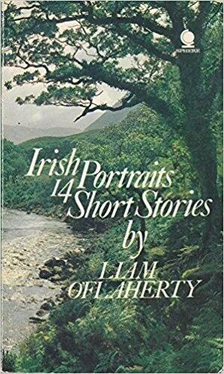“Miss Kelly,” he gasped, between fits of apoplectic laughter that shook his fat girth, “upon my soul there isn’t a word of a lie in it. Go ahead. Ladies first.”
Then he himself entered first, still laughing. The nurse followed him, coughed, took up the fountain pen that hung from her waistband and dabbed at her hair with the end of it. The attendant came up at a smart pace, saluted and whispered something to the doctor. The doctor’s face became serious for a moment. He glanced in Bowling’s direction. Then he began to smile again, rubbed his palms together and looked at the ceiling, at the floor, at the walls, at the windows, smelling everywhere.
“Upon my soul,” he said at last, turning to the nurse “does my old nose - sniff, sniff, - deceive me or can I smell roses?”
The nurse nodded, swallowing her breath modestly. She pointed to the glass door that led to the recreation lawn. “It’s from that bush that grows by the wall,” she murmured, “I saw three there last night.”
“Hm” said the doctor and he walked over to the first bed, throwing out his feet sideways without moving the middle of his body.
Dowling’s heart had begun to beat wildly when the doctor entered the ward. He was delighted and relieved, for the moment, of all anxiety. Now everything would be all right. He could transfer all his worries to that jolly man, with the kind fat face. And what a pretty nurse! Though her face was rather hard. Dowling began feverishly to prepare his confessions. He would explain everything. Then they would discharge him immediately. And in all probability the doctor would take an interest in his case and find him employment suitable to an educated man of good family. He became absorbed in the contemplation of what would happen after that. With his pale cheeks flushed and the extremities of his limbs throbbing with excitement, his mind soared off into a day dream, building castles in the air.
The doctor pulled the clothes back off the first patient’s chest. He put his stethoscope to his ears and bent down to listen without looking at the man’s face. The patient, formerly a peasant farmer named John Coonan, lay perfectly still with his hands lying flat on his abdomen. He stared at the ceiling through little fiery grey eyes that were set close together with a little pointed yellow nose between them. He imagined himself to be hatching twelve eggs in his stomach and he insisted on lying perfectly still, lest he should disturb the formation of the birds.
The doctor’s face gradually lost its merry creases as he listened here and there and tapped here and there. His eyes became sharp. Then they began to blink. Then his whole face looked cross and he straightened himself and cleared his throat. “Now my man…” he began absent-mindedly and then he stopped, puffing out his cheeks. He turned to the nurse and whispered to her, holding her arm as he walked to the next bed: “Now how can ye explain that? That man was getting better yesterday and today he’s a foregone conclusion. Well, well. It’s very queer.” He went up to the next bed.
The patients in the ward had been silent and attentive until then, but suddenly they seemed unable to concentrate any longer on the doctor’s presence. They began to practise with voice and limb the grotesque imitations of whatever their crazed imaginations conjectured themselves to be. Dowling was startled out of his reverie by the gradual renewal of insane sounds about him. Again the true fact of his environment became real to him. He began to tremble violently. The doctor was proceeding rapidly down the ward, casually examining the fairly healthy patients. Dowling could catch the doctor looking at himself now and again. Whenever he caught the doctor’s eyes looking at him, the doctor turned away hurriedly. “He’ll soon be here,” thought Dowling excitedly, “and I can see he’s interested in me already. He sees I’m different from the rest. Now how am I going to commence to talk to him?”
The doctor paused to look at the two old patients who were playing chess. The players never took any notice. Their gaze was concentrated on the board intently. One old fellow had his fingers on a black queen, making tentative excursions in all directions, and then coming back again to his starting point. He had his lips sucked far into his toothless mouth. The other man, clasping his dressing-gown about his withered body, looked on murmuring endlessly: “Five minutes’ pleasure and I have to suffer a lifetime for it. Five minutes’ pleasure and I…” The doctor walked away, followed by the nurse and the attendant.
They passed Dowling without looking at him. This irritated Dowling. He felt slighted. He ceased to tremble and his face darkened. The doctor went to the end of the ward and then came back rapidly up the other side. When he was just at the far side of Dowling’s bed, he stood at the distance of a yard behind Dowling’s head. He began to laugh and told the nurse a funny story about a greengrocer named Flanagan who had made a large fortune through contracts for the new government, in which he had relatives. This fellow Flanagan, a lean, stingy, mean, ignorant peasant, according to the doctor, went off from Harcourt Street Station every Sunday morning with his golf sticks, to play on his, Dr O’Connor’s club links. He was a great joke, this fellow Flanagan. The doctor went on telling anecdotes about Flanagan, laughing violently in a subdued tone while he talked. But all the while he kept examining Dowling’s head while he talked and laughed. Dowling’s body was twitching in the bed with vexation.
The doctor finished his story and again he moved on and passed Dowling’s bed without looking at Dowling. Dowling saw him pass and could restrain himself no longer. He called out angrily: “I say, doctor, I want to speak to you.” The doctor turned about sharply and looked at Dowling seriously. The attendant came up to Dowling and whispered in his low passionless voice: “You must wait your turn.” Then the doctor moved away again from bed to bed, talking, answering questions, examining the patients and joking with the nurse. Dowling watched him, boiling with rage. He decided that he would tell the doctor nothing. He wanted to kill somebody. Why should they persecute him like this? Could nobody in the world be kind to him?
At last the doctor reached the end of the ward and turned back. He came down towards Dowling hurriedly, his face creased in a smile. When he was within five yards of Dowling he held out his right hand and called out: “How are you, Mr. Dowling? Now I can attend to you.” Dowling immediately became soft and good humoured and smiled, a wan smile. The doctor sat down on the bed, still holding Dowling’s hot thin right hand in his own fat two hands. He was looking into Dowling’s wild, strained, big blue eyes with his own little half serious, half merry, half sharp eyes. A mist came before Dowling’s eyes. He swallowed his breath and then he began to talk rapidly, pouring a volume of words out without stopping for breath.
“This is how it happened,” he began. The doctor bent down his head, he kept fondling Dowling’s hand and listened. Dowling described how his mother died young while he was in his last year at college studying for the Indian Civil Service. His mother, a government official’s widow, had an annuity that expired with her death. So Dowling, who had no other means of support, had to leave college and get employment as a newspaper reporter. That was eighteen months ago.
“I tell you,” whispered Dowling, lowering his voice and almost shutting his eyes, ’that what got on my nerves was … er … a queer thing and it may appear silly but … you know I couldn’t give expression to something that was in me … somehow … I don’t know how to tell you … of course I’m not a genius … but every man you know … of a certain class, of course, doctor … I don’t know your name … every man has some creative power … and reporting work is awful … telling lies and rubbish day after day … and nobody understood me … everybody seemed to think that I was cocky and thought myself, on account of my family and that sort of thing, you know, better than the others … so that I chucked it six months ago and knocked about since … and then, desperate, I pretended to be ill so that I could get into hospital….”
Читать дальше












